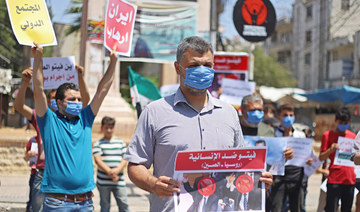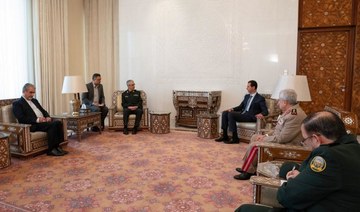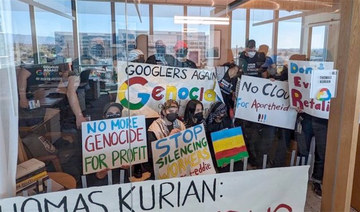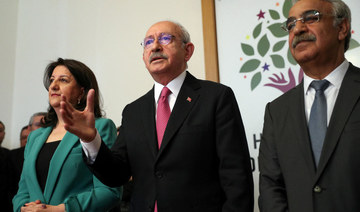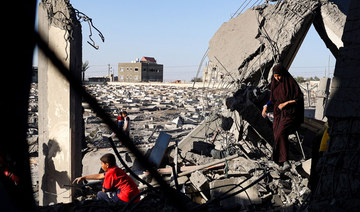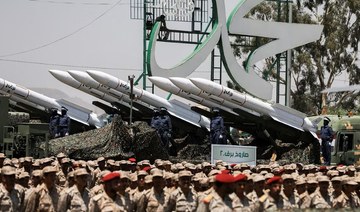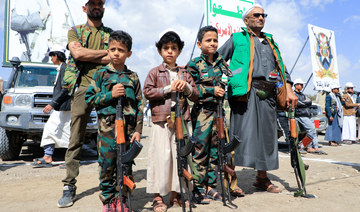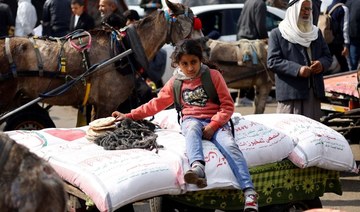UNITED NATIONS: The UN counterterrorism chief said his office received information that 700 people died recently in two camps in northeast Syria, where more than 70,000 mainly women and children connected to Daesh fighters are detained in “very dire conditions.”
Vladimir Vorontsov told a news conference Thursday that the people, including children, died of “lack of medicine, lack of food” at the Al-Hol and Roj camps, which are overseen by Kurdish-led forces allied with the United States who spearheaded the fight against Daesh.
He said the deaths in the camps created “feelings of anger.”
Vorontsov did not clarify when the 700 reportedly died or what the source of the information was. The Kurdish Red Crescent said in January that 511 people died in the largest camp, Al-Hol, in 2019. The overcrowded camps have a high child mortality rate. So far, there has been no known outbreak of coronavirus in the camps. A UN team visited the largest one earlier this month.
Vorontsov urged the international community to tackle “the huge problem” of what to do with these people, saying keeping them in camps “is very dangerous.” He warned that “they could create very explosive materials that could be very helpful for terrorists to restart their activities” in Syria and Iraq.
Daesh, which once controlled large swathes of Iraq and Syria, lost its last Syrian strongholds in early 2019. But despite the loss of its self-styled caliphate, UN experts said earlier this year that the extremist group is mounting increasingly bold attacks in Syria and Iraq and is planning for the breakout of its fighters in detention facilities.
In addition to the Al-Hol and Roj camps, the Kurdish fighters are guarding thousands of Daesh fighters and boys in prisons.
After Daesh militants lost control of the oil-rich northeast, Turkey invaded areas along its borders last October and now controls slivers of land in the very complex region. There are tensions between the Turkish-allied fighters and Kurdish groups, which Ankara considers terrorists. In addition, hundreds of US troops remain in northeast Syria.
The International Crisis Group reported on April 7 that there are 66,000 women and children in Al-Hol and 4,000 in Roj, most of them relatives of Daesh extremists, “but some former affiliates of the group themselves.” The Brussels-based think tank said that the majority are either Syrians or Iraqis, with the numbers roughly split, and around 13,500 are from other countries.
The group said humanitarian workers described the detention sites “as ridden with tuberculosis and perilously overcrowded, with one speaking of `dramatic mortality rates’.”
Vorontsov said “no country would like to have these people back, with this very negative and very dangerous terrorist background.”
But he said there are about 9,000 children and the first priority should be to save those under 6 years old, “because in this period of time children are absolutely not in the position to be indoctrinated.”
Vorontsov said the UN Office of Counter-Terrorism, which he heads, is pushing the issue very strongly with countries whose citizens are detained. Only a small number are repatriating their citizens, including Central Asian countries, the United States and Russia, he said.
Women are “a more difficult story,” Vorontsov said.
There are “victims of terrorism” who didn’t understand what they were doing when they accompanied the men in their families to Syria and Iraq, he said, “but there are a lot of radicalized women among detained people in camps.”
Vorontsov said he believes the way forward is to prosecute the women and then rehabilitate and reintegrate them into society, but he conceded that it’s “a very challenging issue.”
UN official: 700 people died in Syrian camps for Daesh families
https://arab.news/nf3gg
UN official: 700 people died in Syrian camps for Daesh families
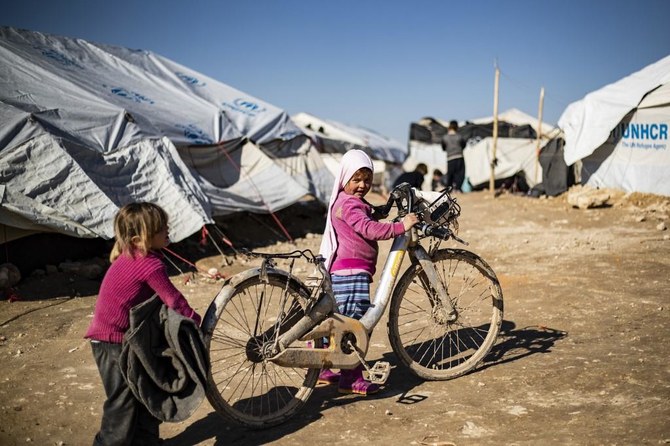
- Vorontsov told a news conference Thursday that the people, including children, died of “lack of medicine, lack of food” at the Al-Hol and Roj camps
- The overcrowded camps have a high child mortality rate
Israeli army strikes 40 Hezbollah targets in south Lebanon
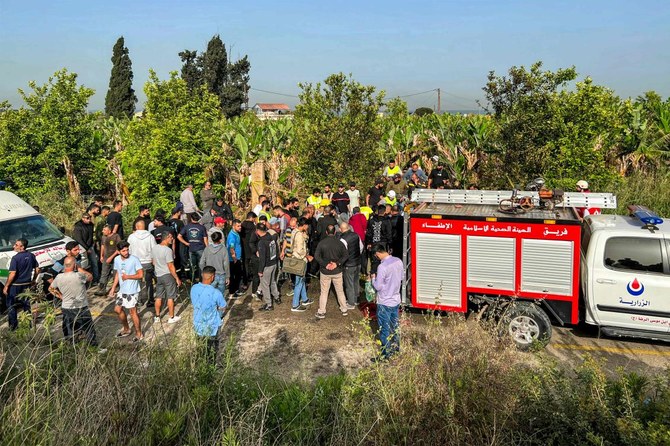
- Hezbollah has exchanged near-daily fire with the Israeli army
- Israel says 11 soldiers and eight civilians have been killed on its side of the border
Beirut: The Israeli army said Wednesday it struck 40 Hezbollah targets in southern Lebanon as near-daily exchanges of fire rage on the border between the two countries.
“A short while ago, IDF (army) fighter jets and artillery struck approximately 40 Hezbollah terror targets” around Aita Al-Shaab in southern Lebanon, including storage facilities and weaponry, the army said in a statement.
Lebanon’s Iran-backed Hezbollah movement said it fired a fresh barrage of rockets across the border earlier in the day after a strike blamed on Israel killed two civilians.
The group had already fired rockets at northern Israel late on Tuesday “in response” to the civilian deaths.
Hezbollah has exchanged near-daily fire with the Israeli army since its ally Hamas carried out an unprecedented attack on Israel on October 7, triggering war in Gaza.
It has stepped up its rocket fire on Israeli military bases in recent days.
Hezbollah fighters fired “dozens of Katyusha rockets” at a border village in northern Israel “as part of the response to the Israeli enemy’s attacks on... civilian homes,” the group said in a statement.
On Tuesday, rescue teams said an Israeli strike on a house in the southern village of Hanin killed a woman in her fifties and a girl from the same family.
Since October 7, at least 380 people have been killed in Lebanon, mostly Hezbollah fighters but also 72 civilians, according to an AFP tally.
Israel says 11 soldiers and eight civilians have been killed on its side of the border.
Turkish minister warns pro-Kurdish party it could face moves to ban it
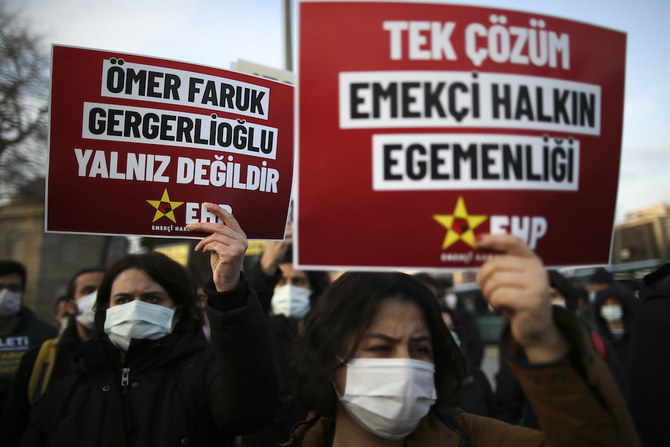
- “In the past, closure cases were opened against parties for supporting terrorism,” Justice Minister Yilmaz Tunc told reporters in Ankara
- “Therefore, we say that if the DEM Party follows the same path, then it will face the same treatment”
ISTANBUL: Turkiye’s justice minister warned the country’s main pro-Kurdish DEM party on Wednesday that it would face the risk of legal action, and even a closure case like its predecessor, if it did not distance itself from Kurdish militants.
DEM, parliament’s third largest party, was established last year as a successor to the Peoples’ Democratic Party (HDP), which is facing the prospect of closure over alleged militant links in a court case following a years-long crackdown.
“In the past, closure cases were opened against parties for supporting terrorism,” Justice Minister Yilmaz Tunc told reporters in Ankara, noting that some parties had been banned and that other cases were ongoing.
“Therefore, we say that if the DEM Party follows the same path, then it will face the same treatment,” he said. “We say keep your distance from terrorism if you do not want to face such a legal process.”
Another court had been expected to announce a verdict this month in a case trying jailed former HDP leaders and officials over 2014 protests triggered by a Daesh attack on the Syrian Kurdish town of Kobani. That verdict was postponed.
“They should not wag their fingers at us. I repeat, the policy of closure, blackmail and threats is over,” DEM Party co-chair Tuncer Bakirhan said on Wednesday in the wake of a call from a government ally to ban the DEM Party.
Critics say Turkish courts are under the influence of the government and President Tayyip Erdogan, which he and his AK Party (AKP) deny.
Both prosecutors and the government accuse the HDP of ties to the militant Kurdistan Workers Party (PKK), which is deemed a terrorist group by Turkiye, the United States and European Union. The HDP denies having any connections with terrorism.
The PKK launched an insurgency against the Turkish state in 1984 and more than 40,000 people have been killed in the conflict. A peace process between Ankara and the PKK fell apart in 2015 and in a subsequent crackdown on the HDP thousands of its officials and members have been arrested and jailed.
UAE, Bahrain call for joint work to contain tensions threatening regional stability

- During a meeting in Abu Dhabi, the ministers discussed the fraternal relations between UAE and Bahrain
DUBAI: UAE Minister of Foreign Affairs Sheikh Abdullah bin Zayed Al Nahyan received his Bahraini counterpart Dr. Abdul Latif bin Rashid Al Zayani in Abu Dhabi on Wednesday.
Sheikh Abdullah bin Zayed welcomed the Bahraini Foreign Minister, and during the meeting held at the ministry’s headquarters in Abu Dhabi, they discussed the fraternal relations between the two countries, and ways to enhance Emirati-Bahraini cooperation at various levels, WAM reported.
Sheikh Abdullah stressed during the meeting that the UAE and Bahrain are linked by historical relations that are becoming more established, developed and growing, and that they also constitute an important tributary to joint Gulf and Arab work.
He also stressed that the current challenges facing the region require intensifying cooperation, coordination and joint work to contain all tensions that threaten its stability, security and safety of its people.
A blast near a ship off Yemen may mark a new attack by Houthis after a recent lull
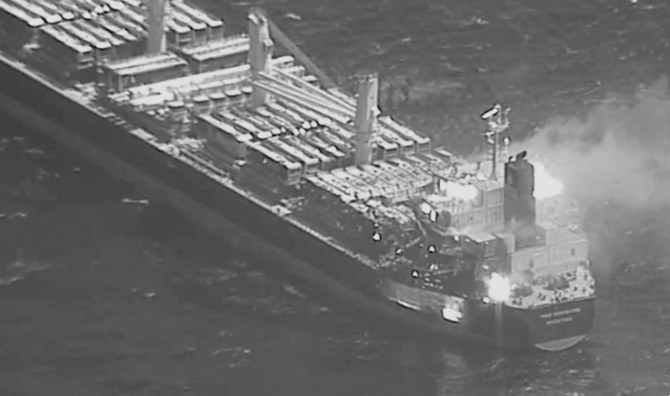
- Houthis have launched more than 50 attacks on shipping, seized one vessel and sank another since November
- The explosion happened some 130 kilometers southeast of Djibouti in the Gulf of Aden
JERUSALEM: A ship near the strategic Bab El-Mandeb Strait saw an explosion in the distance Wednesday, marking what may be a new attack by Yemen’s Houthis through the crucial waterway for international trade.
The explosion, reported by the British military’s United Kingdom Maritime Trade Operations center, comes after a relative lull from the Houthis after they launched dozens of attacks on shipping in the region over Israel’s ongoing war on Hamas in the Gaza Strip.
The Houthis did not immediately claim responsibility for the blast, but suspicion fell on the group as they’ve repeatedly targeted ships in the same area. It typically takes the Houthis several hours before acknowledging their assaults.
The explosion happened some 130 kilometers southeast of Djibouti in the Gulf of Aden.
“The master of a merchant vessel reports an explosion in the water a distance form the vessel,” the UKMTO said. “Veseel and crew reported safe. Authorities are investigating.”
The private maritime security firm Ambrey separately reported the apparent attack.
The Houthis have launched more than 50 attacks on shipping, seized one vessel and sank another since November, according to the US Maritime Administration.
Houthi attacks have dropped in recent weeks as the militia has been targeted by a US-led airstrike campaign in Yemen and shipping through the Red Sea and Gulf of Aden has declined because of the threat. American officials have speculated that they may be running out of weapons as a result of the US-led campaign against them and firing off drones and missiles steadily in the last months.
The Houthis have said they would continue their attacks until Israel ends its war in Gaza, which has killed more than 34,000 Palestinians there. The war began after Hamas-led militants attacked Israel on Oct. 7, killing 1,200 people and taking some 250 others hostage.
The ships targeted by the Houthis largely have had little or no direct connection to Israel, the US or other nations involved in the war. The Houthis have also fired missiles toward Israel, though they have largely fallen short or been intercepted.
Gaza could surpass famine thresholds in six weeks, WFP official says
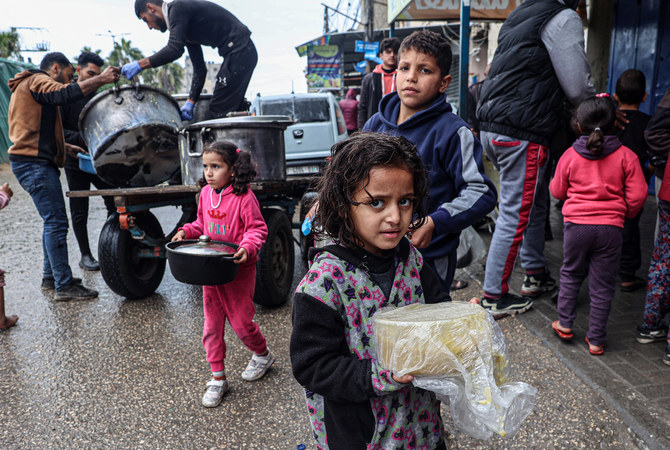
- A UN-backed report published in March said famine was imminent and likely to occur by May in northern Gaza
GENEVA: The Gaza Strip could surpass famine thresholds of food insecurity, malnutrition and mortality in six weeks, an official from the World Food Programme said on Wednesday.
“We are getting closer by the day to a famine situation,” said Gian Caro Cirri, Geneva director of the World Food Programme (WFP).
“There is reasonable evidence that all three famine thresholds — food insecurity, malnutrition and mortality — will be passed in the next six weeks.”
A UN-backed report published in March said that famine was imminent and likely to occur by May in northern Gaza and could spread across the enclave by July. On Tuesday, a US official said the risk of famine in Gaza, especially in the north, was very high.
Cirri was speaking at the launch of a report by the Global Network Against Food Crises, an alliance of humanitarian and development actors including United Nations agencies, the World Bank, the European Union and the United States.
In its report, the network described the 2024 outlook for the Middle East and Africa as extremely concerning due to the Gaza war and restricted humanitarian access, as well as the risk of the conflict spreading elsewhere in the region.
“As for Gaza, the conflict makes it difficult and sometimes impossible to reach affected people,” Cirri said.
“We need to scale up massively our assistance... But under the current conditions, I’m afraid the situation will further deteriorate.”
The United Nations has long complained of obstacles to getting aid in and distributing it throughout Gaza in the six months since Israel began an aerial and ground offensive against Gaza’s ruling Islamist militant group Hamas.
Israel has denied hindering supplies of humanitarian aid and blames aid agencies for inefficiencies in distribution.
Israel’s military campaign has reduced much of the territory of 2.3 million people to a wasteland with a humanitarian disaster unfolding since Oct. 7, when Hamas ignited war by storming into southern Israel.
Cirri said that the only way to steer clear of famine in Gaza was to ensure immediate and daily deliveries of food supplies.
“They’ve been selling off their belongings to buy food. They are most of the time destitute,” he said.
“And clearly some of them are dying of hunger.”



